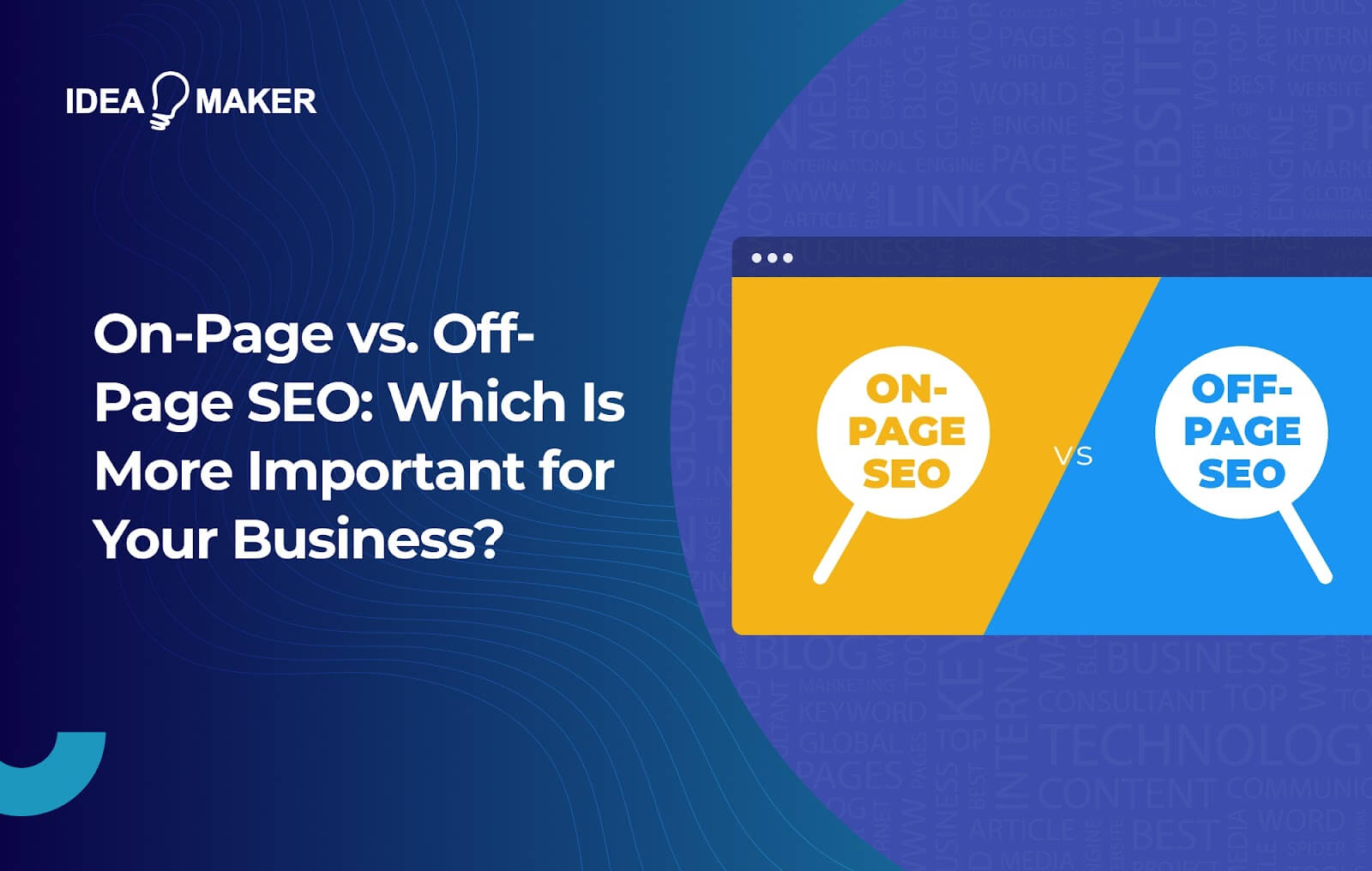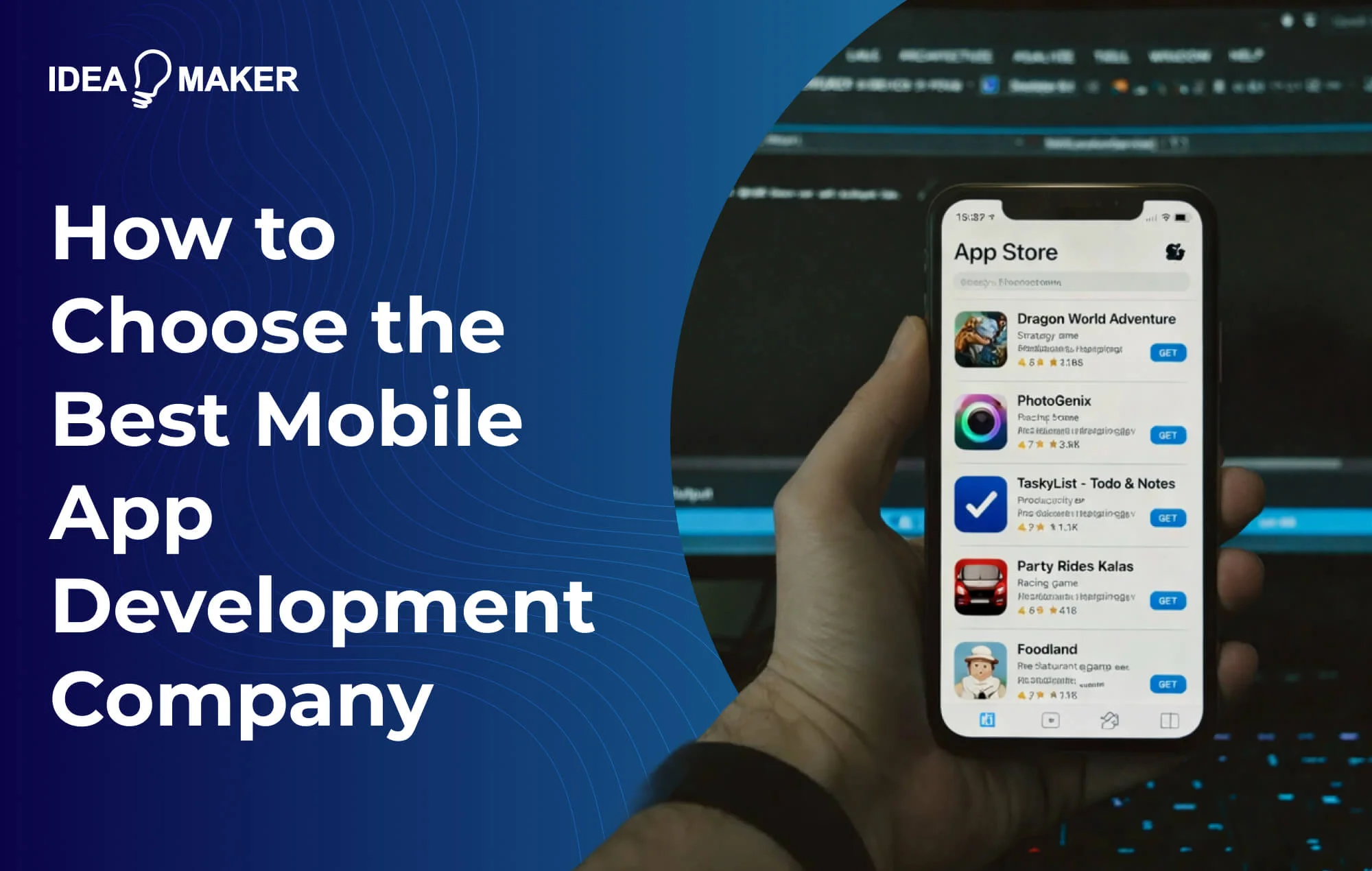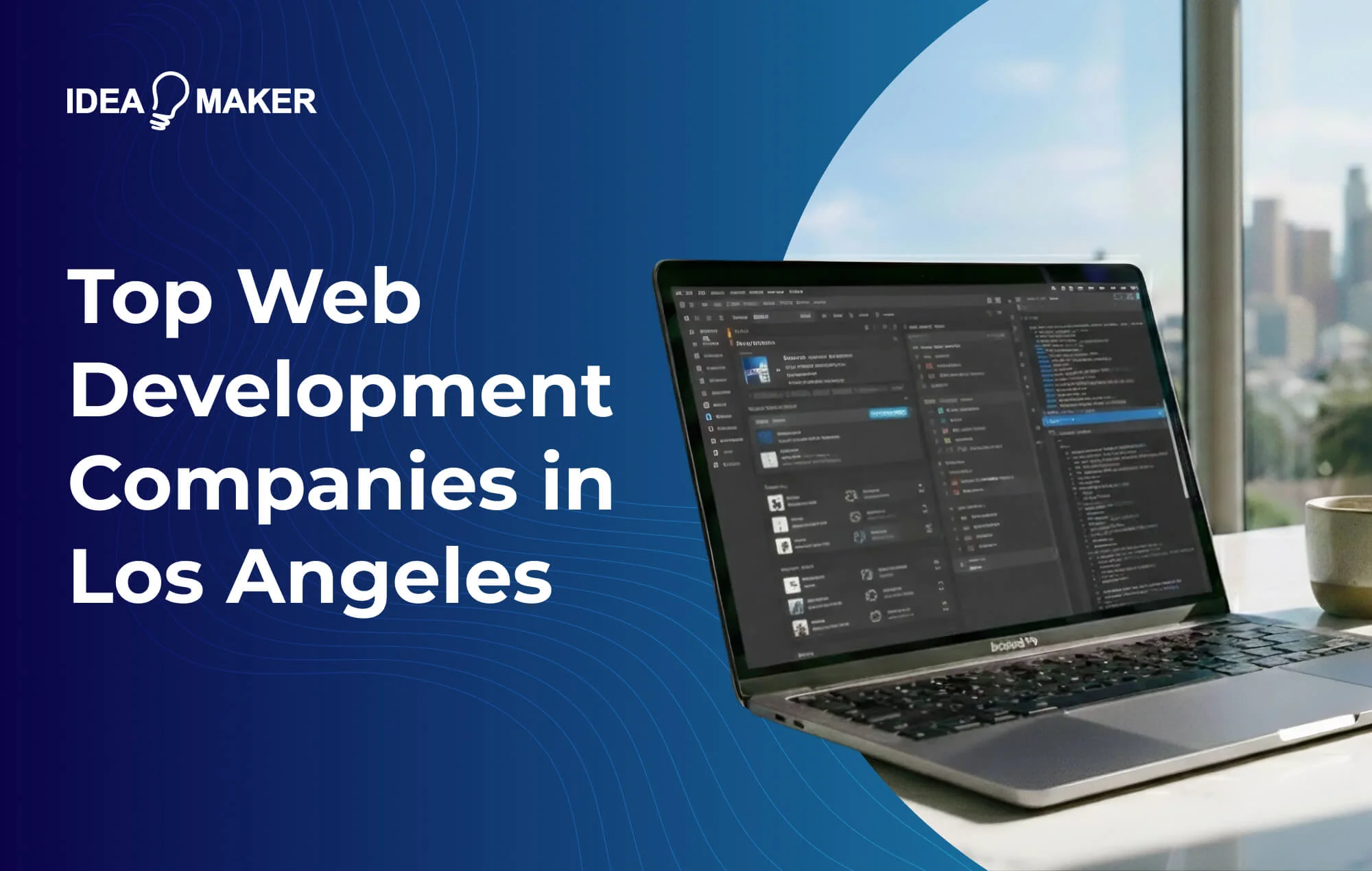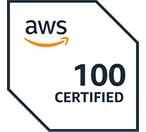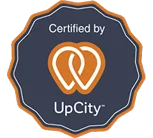Businesses employ many methods to market their website and increase site visitors, the first of which is SEO. Search engines drive more than 50% of web traffic, so developing a robust SEO strategy is essential to developing a solid online presence.
There are several ways to promote your business through SEO, primarily on and off-page SEO. This article will discuss the advantages and disadvantages of both on-page and off-page SEO to determine which method is suitable for your business.
Keep reading to learn more. Otherwise, check out Idea Maker’s guide to getting started with SEO.
Table of Contents
What Is SEO?
Search engine optimization (SEO) is the process of positioning your website to rank highly on search engine results pages (SERPs) by fine-tuning a variety of key elements. SEO scores are based on several factors outlined by search engines like Google, including keyword density, relevance, and other external factors, such as the number of backlinks to the page in question.
While search engine algorithms are complex and frequently updated, there are some core SEO best practices that remain effective. As a result, focusing on optimizing title tags, meta descriptions, header tags, image alt text, and internal links can substantially improve your website’s findability and click-through rates.
Why SEO Is Important?
Ranking highly on search engine results pages is crucial for maximum online exposure, especially seeing as howover 67% of web traffic visits the top five search results. This means you must ensure that your website fits the criteria set out by Google and other search engines. Google’s core ranking factors include page speed, mobile friendliness, security protocols, quality backlinks, and compelling content. So, in order to rank well, it’s important to focus on optimizing page load times by minifying code, compressing images, and using a content delivery network.
How Do Search Engines Rank Websites?
Search engines use complex algorithms to rank web pages. They analyze a variety of on and off-page optimization elements to determine which pages are most relevant and authoritative for search queries.
On-page signals like content, technical structure, and metadata help assess individual page relevance, while off-page signals such as backlinks, brand mentions, and domain authority help evaluate the site’s overall reputation. Because web pages that demonstrate expertise through strong optimization and external validation get ranked higher, an integrated on-page and off-page approach provides the best signals to ascend in rankings.
What Is On-Page SEO?
On-page SEO refers to optimizing the HTML source code and content on a web page to rank higher on search engine results pages (SERPs). This involves researching and incorporating keywords and phrases that users search for into elements like title tags, headers, image alt text, meta descriptions, and body content.
The goal of on-page optimization is to make pages more relevant for specific queries so search engines will rank those pages higher. If done properly, this will create a solid SEO foundation before focusing on other factors like link building. By optimizing on-page elements with keywords users are searching for, websites can better reach users who are actually interested in their products or services.
Factors Important for On-Page SEO
Optimizing individual web pages for search engine visibility is vital for ranking higher in SERPs and, in turn, attracting more organic clicks and traffic. By leveraging key on-page ranking factors and elements, you can significantly improve your SERP visibility and click-through rate from search queries.
Search Intent
Optimizing content for informational, transactional, or navigational intent is crucial because it helps match the page to the user’s purpose behind each keyword. This relevance signals search engines to rank the page for the right queries.
Content Quality
Unique, high-quality content is critical for on-page SEO because it provides value for users. This is because thin duplicated content lacks substance and tells search engines the page shows no authority on the topic. In-depth, engaging content, on the other hand, builds relevance.
URLs
Optimized, descriptive URLs are important because they support keyword targeting and help search engines understand the page content. Unintuitive URLs will harm a website’s crawlability and user experience.
Page Titles
Page titles serve multiple key functions for on-page SEO. An appealing, keyword-optimized title, for example, will effectively summarize the content, attract user clicks, and boost rankings for target terms.
Meta Description
Compelling meta descriptions will help increase a website’s click-through rate by enticing searchers to visit the site. Because generic descriptions fail to convert searchers into visitors, it’s best to tailor descriptions specifically for each page rather than using one vague description site-wide.
Outbound Links
Strategic outbound links demonstrate authority by connecting to credible external sources. You should always try to add outbound links that point to trusted, high-authority sites, so that you appear more credible to both visitors and search engines.
Schema Markup
Schema markup provides semantic context about the page to search engines, improving crawling and enhancing display in SERPs. This means it’s essential that you correctly match schema and content so search engines can gain an accurate understanding of web page content. Fortunately, there are several types of schema that can match specific content, including FAQ schema and article schemas.
Internal Links
Internal links enable site navigation and pass authority between related pages. As a result, when trying to boost the rankings of a poorly performing page, internally linking from a better optimized page can lead to improved rankings across both pages.
Page UX
Solid page user interface, page flow, and properly positioned calls-to-action help to reduce your website’s bounce rate, as a poor user experience generally causes visitors to leave websites. A high bounce rate ultimately signals a low-quality website, causing search engines to lower its rankings.
Advantages of On-Page SEO Strategy
Performed correctly, on-page SEO is an effective way to drive organic traffic to your business’s website. Unlike off-page SEO, on-page is completely within your control, meaning continuous optimization is required in order to yield long-term benefits. Here are several advantages of employing an on-page SEO strategy.
Boost Organic Traffic
By optimizing your website content for search engines, on-page SEO allows you to rank higher on the search engine results page. As a result, your website becomes visible to more web users and potential customers. If your meta descriptions and title tag are correctly positioned, this will encourage users to visit your site.
As your CTR grows, your website’s SEO score will increase. This means that your website’s overall SERP rank will improve, and more traffic will be generated.
Improved Local Search
When a web user searches for local companies, on-page SEO can be used to increase your website’s visibility. This is done by including relevant keywords and information such as your business’s location and industry.
For example, with a properly optimized website, any California-based developers will appear when an individual searches ‘software developers, California.’ Improving your website’s visibility in local search results is an excellent way to connect with nearby clients with a genuine interest in your product.
Advanced Crawl Rate
Crawl rate is the time it takes for Google to scan and index your website pages. Though crawl rate does not factor into SERPs ranking directly, your site needs to be crawled efficiently to achieve a swift ranking. While your web pages remain un-crawled, they cannot be ranked, meaning you miss out on potential traffic.
Well-executed on-page SEO makes the crawling process smooth, as the required information is readily available for Google bots. On-page practices such as inserting correct metadata and regularly updating content contribute to a webpage’s crawl rate.
Disadvantages of On-Page SEO
On-page SEO is an effective method many businesses use to improve their online presence; however,it’s not without its problems. In fact, on-page SEO is time consuming, especially for large websites, and it can be difficult to know which factors to optimize.
Google Penalties
If a website has engaged in black-hat on-page SEO tactics, such as keyword stuffing and suspicious linking, Google will relegate the site’s rank. Though the solution may sound as simple as avoiding black-hat techniques, it’s easy to engage in such tactics inadvertently. For example, in some cases it’s necessary to repeat a keyword when creating content but Google may identify this as keyword stuffing, despite the context.
The best way to avoid these issues is to hire a professional SEO marketing company, like Idea Maker. Our experts have the experience and resources to help your website rank higher without using black-hat techniques.
High Competition Rates
With over 1.7 billion websites in existence today, many of which operate in the same industry, SEO competition is high. As more competing websites target high-volume keywords, the keyword difficulty rises. This means that it’s challenging to rank your website for high-volume keywords and phrases.
The catch-22, however, is that low-difficulty keywords often have a low search volume, meaning targeting them is less likely to be fruitful. As a result, it is tough to beat competitor rankings without a robust SEO strategy or professional knowledge.
What is Off-Page SEO?
Off-page SEO refers to factors and activities occurring outside of your website that influence your site’s search engine rankings and visibility, such as backlinks. This is important because search engines evaluate external signals to assess a website’s authority and relevance. Essentially, the higher the authority and more relevant to a search query the website is, the more likely it is to be ranked highly. By combining quality on-page optimization with an effective off-page strategy, sites can improve organic search visibility, traffic, and conversions.
Factors That Make Up Off-Page SEO
The external signals making up a site’s off-page SEO play a key role in organic visibility. So, by leveraging strategic off-page optimization techniques, sites can complement strong on-page SEO to improve their ranking potential. Here are a few key factors affecting off-page SEO.
Backlinks
Quality backlinks from reputable external sites help demonstrate a site’s credibility and authority on a topic. Search engines interpret backlinks as votes of confidence, meaning relevant links from trusted sources can improve search rankings. Low-value manipulative links, however, often hurt more than they help.
NAP Citations
Having consistent business name, address and phone number (NAP) citations across key directories boost local SEO rankings, as it signals relevance for localized searches. Inconsistent NAP data can negatively impact local targeting.
Guest Blogging
Publishing relevant guest posts on industry blogs can secure valuable backlinks and increase subject matter expertise in search engines’ eyes. It’s important to note that, when it comes to guest blogs, all content posted must add value for the audience rather than just being link bait.
Broken Link Building
Identifying broken links on high authority pages and providing the webmaster with an appropriate replacement resource on your own site can earn a quality backlink. For this, you’ll need to focus on helpfulness rather than manipulative SEO tricks.
Advantages of Off-Page SEO Strategy
Proper off-page SEO strategies are just as effective as on-page and come with many benefits, including higher search engine rankings as a result of increased backlinks. Here are some of the top advantages of employing an off-page strategy.
Increased Domain Authority
By utilizing an off-page SEO strategy, businesses can increase their website’s domain authority. As backlinks and guest posts accumulate, Google will see that your page is a consistently referenced source of information. As a result, the algorithm will identify your website as having high authority and usefulness.
As previously discussed, when ranking a website, Google considers domain authority. This means that as your site is recognized as authoritative, it will achieve better search engine rankings, resulting in more visitors to your website.
Extended Reach
Off-page SEO heavily relies upon link building, which is done through guest posting on other websites and linking to your website on social media. Link building is an excellent way to build an online presence beyond your existing following, extending your reach.
Your SEO scores will increase as your domain becomes more widespread across the internet, giving your website greater visibility online. What’s more, a solid link building strategy opens your business up to cross-pollination of clients through guest post readers and social media users following anchored links.
Enjoy the Success of Others
Because off-page optimization largely relies on collaboration with other websites, such as blogs and forums, it allows you to enjoy the marketing campaigns of those sites. If your content is posted on a website with consistent marketing efforts, your website will indirectly gain greater exposure through backlinks.
Google considers the authority of the websites that feature your backlinks. As these websites grow, so will the competitiveness of your website and SERP ranking. Guest blogging on high-quality, active sites is an effective way to increase organic traffic.
Disadvantages of Off-Page SEO
Despite the powerful benefits of off-page SEO tactics,there are some disadvantages associated with this strategy, such as the high amount of time it takes to build backlinks. Here are just a few drawbacks to off-page SEO.
Attracting the Wrong Audience
When you post an article to a guest site, you share an audience with the domain holder. In some cases, this can lead the wrong types of customers to your website as they have no genuine interest in your business. This is because guest posting does not allow you direct control over audience targeting.
So, although you may reach a broad audience and gain many additional visitors, they are often disinterested. This means off-page SEO work can sometimes be in vain.
Low-Quality Backlinks
When submitting a post to a guest site, it’s challenging to determine the quality of the website without professional tools. As a result, many businesses post to low-authority sites, leading to sub-standard backlinks. This comes with two significant issues.
First, it means your website will not achieve a high traffic volume through backlinks. Second, Google may identify your backlinks as suspicious and penalize your website.
Why Are On-Page And Off-Page SEO Important?
On-page and off-page optimization work hand-in-hand to improve a website’s search engine rankings. By leveraging both approaches, sites can maximize their search visibility.
On-page SEO enables individual pages to effectively demonstrate relevance to search algorithms through optimized page-level elements like titles, content, technical structure, and metadata, showing search engines that the page merits ranking well for targeted keywords.
Off-page SEO complements these page signals by building overall site-wide authority and trust, since earning high-quality backlinks, brand mentions in publications, and strong domain metrics demonstrate external credibility. A strategic combination of page-level optimization and holistic authority-building allows websites to ascend in the competitive SERP landscape.
Which Method Is Right for You?
As discussed above, both on and off-page SEO strategies have advantages and drawbacks. So, which SEO method is suitable for your business? The truth is, an effective website SEO marketing campaign will include elements of both on and off-page SEO.
Employing only one technique will result in a less effective campaign, as the two rely on each other for the best results. However, running a comprehensive SEO campaign is challenging without the proper resources and marketing knowledge. That’s where Idea Maker comes in.
Expert SEO Solutions from Idea Maker
With proven SEO services, the experts at Idea Maker can optimize your on-page content, site architecture, technical performance, and off-page ranking factors for maximum online exposure. This holistic approach enables us to unlock greater organic visibility in search engines like Google, ensuring your site can gain more visitors, leads, and sales.
Our team of dedicated SEO consultants has years of experience utilizing the latest algorithm updates and best practices to drive results for brands across diverse industries. We can also conduct an in-depth site audit and provide data-driven recommendations to strengthen your SEO foundations and reach your search-ranking goals.
Schedule a free website ranking assessment and consultation today to learn more about how our SEO specialists can help your website achieve the visibility it deserves.
